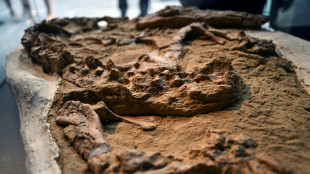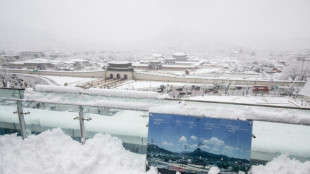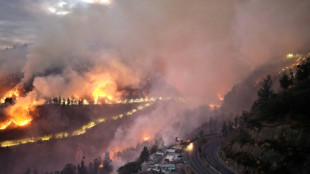
-
 Peru scientists unveil crocodile fossil up to 12 million years old
Peru scientists unveil crocodile fossil up to 12 million years old
-
At plastic treaty talks, no united front for industry

-
 Williamson falls for 93 as England fight back in first Test
Williamson falls for 93 as England fight back in first Test
-
South Korea officials say three dead in heavy snowfall

-
 High-flying Fiorentina face test of Scudetto credentials with Inter visit
High-flying Fiorentina face test of Scudetto credentials with Inter visit
-
Verstappen switches focus to re-boot defence of F1 teams' title

-
 UK filmmaker Richard Curtis makes first foray into animation
UK filmmaker Richard Curtis makes first foray into animation
-
Countrywide air alert in Ukraine due to missile threat

-
 China's military corruption crackdown explained
China's military corruption crackdown explained
-
Primark boss defends practices as budget fashion brand eyes expansion

-
 Williamson eyes ton as New Zealand take control against England
Williamson eyes ton as New Zealand take control against England
-
Norway faces WWF in court over deep sea mining

-
 Trump, Sheinbaum discuss migration in Mexico amid tariff threat
Trump, Sheinbaum discuss migration in Mexico amid tariff threat
-
Asian markets mixed after subdued pre-holiday shift on Wall St

-
 Orban's soft power shines as Hungary hosts Israeli match
Orban's soft power shines as Hungary hosts Israeli match
-
'Retaliate': Trump tariff talk spurs global jitters, preparations

-
 'Anti-woke' Americans hail death of DEI as another domino topples
'Anti-woke' Americans hail death of DEI as another domino topples
-
Trump hails migration talks with Mexico president

-
 Truckers strike accusing Wagner of driver death in Central African Republic
Truckers strike accusing Wagner of driver death in Central African Republic
-
London police say 90 victims identified in new Al-Fayed probe

-
 Air pollution from fires linked to 1.5 million deaths a year
Air pollution from fires linked to 1.5 million deaths a year
-
Latham falls for 47 as New Zealand 104-2 in first England Test

-
 US tells Ukraine to lower conscription age to 18
US tells Ukraine to lower conscription age to 18
-
Judge denies Sean Combs bail: court order

-
 Suarez extends Inter Miami stay with new deal
Suarez extends Inter Miami stay with new deal
-
Perfect Liverpool on top of Champions League, Dortmund also among winners

-
 Liverpool more 'up for it' than beaten Madrid, concedes Bellingham
Liverpool more 'up for it' than beaten Madrid, concedes Bellingham
-
Aston Villa denied late winner against Juventus

-
 Mexico president hails 'excellent' Trump talks after US tariff threat
Mexico president hails 'excellent' Trump talks after US tariff threat
-
Leicester set to appoint Van Nistelrooy - reports

-
 Coffee price heats up on tight Brazil crop fears
Coffee price heats up on tight Brazil crop fears
-
Maeda salvages Celtic draw against Club Brugge

-
 Villa denied late winner against Juventus
Villa denied late winner against Juventus
-
Dortmund beat Zagreb to climb into Champions League top four

-
 Mbappe misses penalty as Liverpool exact revenge on Real Madrid
Mbappe misses penalty as Liverpool exact revenge on Real Madrid
-
Brazil's top court takes on regulation of social media

-
 Thousands still queuing to vote after Namibia polls close
Thousands still queuing to vote after Namibia polls close
-
Trump taps retired general for key Ukraine conflict role

-
 Canadian fund drops bid for Spanish pharma firm Grifols
Canadian fund drops bid for Spanish pharma firm Grifols
-
Argentine ex-president Fernandez gives statement in corruption case

-
 Mexico says Trump tariffs would cost 400,000 US jobs
Mexico says Trump tariffs would cost 400,000 US jobs
-
Car-centric Saudi to open first part of Riyadh Metro

-
 Brussels, not Paris, will decide EU-Mercosur trade deal: Lula
Brussels, not Paris, will decide EU-Mercosur trade deal: Lula
-
Faeces, vomit offer clues to how dinosaurs rose to rule Earth

-
 Ruby slippers from 'The Wizard of Oz' up for auction
Ruby slippers from 'The Wizard of Oz' up for auction
-
Spain factory explosion kills three, injures seven

-
 US Fed's favored inflation gauge ticks up in October
US Fed's favored inflation gauge ticks up in October
-
Defence lawyers plead to judges in French mass rape trial

-
 US says China releases three 'wrongfully detained' Americans
US says China releases three 'wrongfully detained' Americans
-
New clashes in Mozambique as two reported killed


'Water police' patrol drought-hit Los Angeles streets
Damon Ayala patrols the streets of drought-stricken Los Angeles every day, inspecting the sidewalks. Each time he sees a puddle, he stops.
He is part of the city's Department of Water and Power team, which looks into hundreds of community complaints filed by neighbors each week about water waste.
"It's not extreme, but it's something that we want them to take a look at," he says of one pool of water.
"Looks like they have drip irrigation on this side. So there might be just a broken connector."
Ayala's patrol comes as California and the western United States are in the grip of a severe, years-long drought.
Scientists say global warming driven by human activity, including the unchecked burning of fossil fuels, is creating a greater number of extreme events.
With reservoirs and rivers at historic lows, Los Angeles authorities have brought in water restrictions, such as limiting lawn irrigation to as little as eight minutes, twice per week.
Ayala notes down the addresses of properties where he finds evidence of infringement. The first violation prompts a warning.
"A lot of times they don't know about the ordinance, and that's our job to educate them," he said.
Repeat offenders are fined between $200 and $600.
"We're not looking really for their money -- that doesn't get us more water. We're trying to get behavioral change," he said.
"So that way we can capture the water savings from making those changes."
After a fifth infraction, a device is installed which physically restricts a household's supply, although Ayala says that step has rarely been necessary.
"We've been in serious drought situations in the past in the city of Los Angeles, and its citizens responded," he said.
"And we expect them to respond this time around too."
- 'Obvious choice' -
The water department says it is beginning to see results.
Officials noted a reduction in residential water demand in June, compared to the same month last year.
But as the drought worsens, more permanent changes to the city's landscape could become necessary.
Famous for its rows of palm trees, Los Angeles has also traditionally been known for its lush, green lawns, maintained with automatic sprinklers.
Residents are increasingly replacing their thirsty lawns with plants native to this desert region.
"When we think of how much water gets used in a residential setting, over 50 per cent is actually used outdoors," said Pamela Berstler, executive director of urban landscaping firm G3 Garden Group.
She and her colleague Marianne Simon teach classes as part of a city program to encourage Angelenos to trade in their lawns for alternatives.
South Los Angeles residents Gabriel Golden and Danielle Koplinkase, joined the program a few years ago.
"The environmental impact of watering a lawn, not only in the midst of a draught but also living in a very dry climate, made this an obvious choice," they said.
"We also sought to inspire our neighbors and community by going to a drought tolerant and native garden."
Native plants such as California oak, and flowers that only require a few drops of water each week to thrive, now adorn the couple's garden.
"There are parts of southern California where they have cut the water down to one day of watering per week," said Simon.
"And the reality is that these kinds of gardens would be fine on that amount of water -- in fact, could do with less -- but our traditional lawns can't survive on that."
- 'Short-sighted' -
Other popular alternatives include artificial lawns or gravel, although Simon stresses the environmental benefits of maintaining some form of vegetation.
"The problem is that we are so short-sighted and so narrow in our vision that all we can see is saving the water," she said.
A planted area can be cooler by "easily 20 degrees" Fahrenheit (10 degrees Celsius) than a gravel replacement, and "there's the ability to hold on to rain when we do get it so that we can replenish aquifers."
As she speaks, a nearby sprinkler turns on under the blazing California sun, spraying a lawn during prohibited hours.
With the thermometer hovering around 97 degrees F, water falling on the wilted, uneven grass and trickling down the sidewalk evaporates within minutes.
"It's heartbreaking to see, but it's also a lesson," she said, pointing to the withered garden.
"That should be our past and this should be our future," Simon added, looking back at the native plants.
C.Meier--BTB

